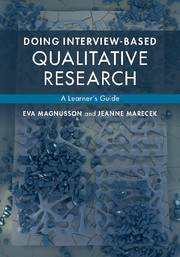Book contents
- Frontmatter
- Contents
- 1 Introduction
- 2 Some examples of interpretative research
- 3 Planning and beginning an interpretative research project
- 4 Making decisions about participants
- 5 Designing the interview guide
- 6 Doing the interview
- 7 Preparing for analysis
- 8 Finding meanings in people's talk
- 9 Analyzing stories in interviews
- 10 Analyzing talk-as-action
- 11 Analyzing for implicit cultural meanings
- 12 Reporting your project
- Epilogue
- References
- Index
9 - Analyzing stories in interviews
Published online by Cambridge University Press: 05 October 2015
- Frontmatter
- Contents
- 1 Introduction
- 2 Some examples of interpretative research
- 3 Planning and beginning an interpretative research project
- 4 Making decisions about participants
- 5 Designing the interview guide
- 6 Doing the interview
- 7 Preparing for analysis
- 8 Finding meanings in people's talk
- 9 Analyzing stories in interviews
- 10 Analyzing talk-as-action
- 11 Analyzing for implicit cultural meanings
- 12 Reporting your project
- Epilogue
- References
- Index
Summary
Stories are a means by which people impose order on their experiences. They are, therefore, a key element of how people make sense of themselves and their worlds. The narrative theorist David Herman (2009) offered a succinct definition of “story”: “stories are accounts of what happened to particular people and of what it was like for them to experience what happened – in particular circumstances and with specific consequences. Narrative, in other words, is a basic human strategy for coming to terms with time, process, and change” (p.2).
By looking closely at the way that people make stories out of their experiences, researchers can glimpse the worldviews and understandings that are the building blocks of their stories. Although people's stories about their experiences are personal, their meanings are put in place through joint action, that is, in transactions with others. Meanings are both local (i.e., negotiated within local interpretive communities such as family and friends) and cultural (i.e., shared by broader interpretive communities). As people tell their stories, they may make many kinds of meanings. For example, they may attribute motives to themselves and others, they may ascribe or imply causality, and they may convey, directly or indirectly, their evaluative perspective regarding the events in the story.
The analyses we describe in this chapter have goals similar to the goals of the analyses you learned about in Chapter 8. As in Chapter 8, the analyses aim to identify regularities or shared features in a set of interviews. Such analyses can help you answer researchable questions about your participants' meaning-making in relation to the interpretive communities of which they are part. Although different persons do not tell the “same” story, people who are members of the same interpretive community build their personal stories from similar building blocks of meaning.
How can analyzing stories told by your research participants help you address your researchable questions? It is unlikely that your initial researchable questions would be “What stories about the phenomenon did the participants tell in the interviews?” However, it is likely that a close look at the stories that participants tell in interviews will tell you things that would be difficult to find out in other ways. For example, stories open a window onto people's evaluative perspectives. What you learn by analyzing stories can add to the body of knowledge that you are accumulating about the researchable questions.
- Type
- Chapter
- Information
- Doing Interview-based Qualitative ResearchA Learner's Guide, pp. 102 - 122Publisher: Cambridge University PressPrint publication year: 2015
- 1
- Cited by



